I just finished reading The Righteous Mind: Why good people are divided by politics and religion by Jonathan Haidt, published in 2012. I bought this book on a whim while browsing at Powell’s Books in Portland – mostly because I’ve lost several friendships with people in the past few years whom I used to respect (but now we cannot understand each other).
This book is extremely well written and while it jumps between various studies and research, it is written such that people without a degree in moral philosophy can understand. While the author is himself a liberal, this is definitely not a liberal book. As the book was written well before 2016 election, I would be very interested to hear his thoughts on all that has occurred since 2012 in the political world.
This book is so important that I’m going to try to summarize it’s message. This will make this post very long and I’ll probably misrepresent some of the message.
If you don’t have the patience to read this, then I’d suggest watching his TED talk: https://www.youtube.com/watch?v=8SOQduoLgRw
The book has three distinct parts, each with its own premise and metaphor.
Part 1: Intuitions come first, strategic reasoning second.
Metaphor: The mind is divided like a rider on an elephant, and the rider’s job is to serve the elephant
My summary: Rational thought is not what I thought it was!

Our emotional brains are like an elephant, and our reasoning is like a person riding the elephant. We like to think of ourselves as logical thinkers, so obviously we think of the rider as controlling and steering the elephant wherever we want it to go. But that is not the case – our decisions are based on emotions much more than on logic thought.
If this sounds counter intuitive, think of yourself buying a new refrigerator. If there are only two or three to choose from, it is easy to compare features and to make a logical choice. But what if there are 30 to choose from? At some point you start leaning towards brands that you like and start eliminating all options that don’t include water in the door. Some people feel no emotions at all (usually due to injuries) – they don’t flinch when shown horrible images and they don’t smile when shown happy ones. These people tend to make horrible decisions because every decision for them is like buying a refrigerator – there is only so much data that they can process at a given time.
We think that since the rider has a clearer vision that it might control the elephant, but the rider mostly becomes a spokesperson for the elephant. When the elephant starts leaning in a certain direction, we immediately start justifying the new direction. Think of the rider more like a lawyer acting in the client’s best interest. It may not always even agree with the elephant, but its primary job is to justify its actions.

Hence, moral arguments are rarely productive because we think that convincing the rider will make a difference. It is like trying to make a dog happy by physically wagging its tail.
It is technically possible for the rider to control the elephant, but it is very rare. When was the last time that you changed political parties or religious beliefs? It does happen (my beliefs have changed drastically in the past 10 years), but such changes normally take an embarrassingly long time and are initiated by a drastic event. Society is much better at influencing your elephant than you are.
If the purposes of our brains are to find truth, why did we evolve an inner lawyer rather than an inner judge or scientist who is more able to determine truth? The sad answer is the historically we cared much more about reputation than truth. Reason is not fit to rule – it is designed to seek justification rather than truth.
To design an ethical society, we’d need to make it so that everybody’s reputation is on the line all of the time, so that bad behavior will bring bad consequences.
But making people accountable for their decisions/behavior only really works when the following is true:
- They know that their decisions will be held accountable by an audience.
- They do not know the leanings of that audience.
- They assume that the audience is well informed and interested in accuracy.
Our moral thinking is much more like a politician looking for votes than a scientist searching for truth because:
- We are obsessed with polls. We might have our own moral compass, but that compass is heavily influenced by public opinion.
- Our internal press secretary immediately justifies everything. People (especially very smart people) are usually bad at finding reasons why the other side might be correct.
- We lie, cheat, and justify so well that we honestly think that we are honest. Most people will cheat up to the point of plausible deniability. We cheated up to the point where cheating more would be hard to defend (even if only to ourselves).
- Reasoning (and google) can take you wherever you want to go. When we ask ourselves “can I believe something,” we only need a single reason to give us permission (no matter how weak or strong). Google will always find a reason why you “can” believe whatever you like.
- We can believe almost anything that supports our team. In fact, we often care more about our teams than ourselves. Extreme partisanship is literally addictive.
- The rationalist’s delusion. We believe that rational people are inherently better, but for actions that can be measured, moral philosophers rate the same as everybody else. Reason usually isn’t used to find truth, but rather to generate arguments in our defense. This why diversity of thought is important. The worship of reason is inherently flawed.
Part 2: There is more to morality than harm and fairness
Metaphor: The righteous mind is like a tongue with six taste receptors
My summary: My palette is very limited

Most moral research has been done by/in western, educated, industrialized, rich, democratic (WEIRD) populations. WEIRD people tend to see a world full of separate object rather than relationships.
There are many “moral matrices” which define morality in various cultures. For example:
- “Autonomy” is common in the west. People are individuals that are free to optimize for their personal fulfillment and happiness.
- “Community” posits that people are first and foremost members of larger entities, such as families, tribes, teams, armies, and nations. We should optimize for the good of the group.
- “Divinity” posits that we are divine souls placed into temporary bodies. We should not degrade out souls or bodies.
Morality is like taste. We might all have a sweetness receptor, but that does not mean that we all like the same sweet things (or that there’s no such thing as too much sugar in your coffee).
Our brains are neither hardwired nor are they blank slates – they are more like an unpublished book where nature writes the first draft. Everything can be changed, but it often isn’t (or the tweaks may be minor).
These are the six main moral foundations that drive our personal morals:
Care / harm foundation

Both liberals and conservatives care about reducing harm, although liberals tend to have a more universal view of who they care about. For most liberals, this is the most important foundation.
Conservatives do care about this, but usually not as strongly as liberals. For example, look at bumper stickers – liberals are more likely to have a bumper sticker about stopping a war or genocide. Such bumper stickers are more rare for a conservative, although you will occasionally see bumper stickers advocating to care for our veterans.
Fairness / cheating foundation

Both liberals and conservatives care about fairness. For example:
- Liberals might care about the fairness of the rich not paying their share of taxes.
- Conservatives might care about the fairness of their tax dollars going towards lazy people and immigrants.
Both groups often care about fairness in different ways.
- Liberals usually focus on equality.
- Conservatives tend to focus on proportionality – people should be rewarded based on what they contribute, even if the outcomes are unequal.
Both groups care about the “free rider” problem where somebody takes more than they deserve, but conservatives care much more than liberals. Conservatives rely more on the fairness foundation when it is tied to proportionality.
Liberty / oppression foundation
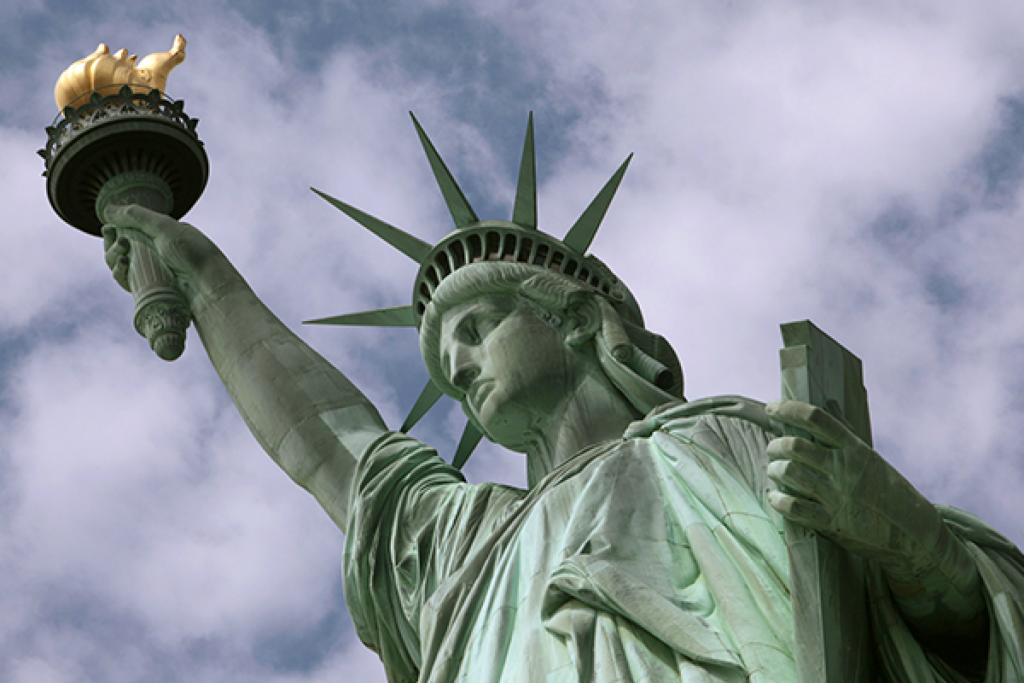
Liberals and conservatives both care about oppression, but:
- Liberals tend to be more universalists – fighting for civil rights and human rights, and sometimes even equal outcomes (which doesn’t work with capitalism). They see oppression as coming from rich capitalists and systems that are unfair to all people.
- Conservatives care about oppression, but mostly regarding their own tribe. They see oppression in higher taxes or government regulations.
Hence, conservatives tend to talk about “liberty”, whereas liberals tend to talk about “equality.”
Loyalty / betrayal foundation

We are descended from successful tribalists – not their individualist cousins.
Liberals rank the care foundation much higher than loyalty and they tend toward universalism. Hence, if they see people being hurt by an institution (e.g. police during BLM) or by US policy, they will speak out against it.
Conservatives are much more about loyalty. As an example of how they see liberals, refer to Ann Coulter’s book Treason: Liberal treachery from the cold war to the war on terrorism.
Authority / subversion foundation

Authority produces hierarchies that can be good or bad. Either way, authority should be much more than just raw power backed by the threat of force – authorities should take on responsibility for maintaining order and justice. When this is done fairly, we all benefit.
Liberals often define themselves as opposed to authority, whereas conservatives embrace it (and the hierarchies that it creates).
He also makes the point that “alpha males” are not true leaders – most of the time they are bullies who take what they want. It is common for chimpanzees to gang up and kill an alpha male. Society moved away from alpha male leadership about 5,000 years ago when tools and spears meant that anybody who felt excluded could kill the alpha.
Sanctity / degradation foundation

This foundation makes certain objects or behaviors “untouchable” – either because the object/behavior is bad or because it is holy. Apart from religion, many people find certain behaviors disgusting (and hence they become taboo).
The religious right cares a lot about sanctity, but is also used by the spiritual left (e.g. organic foods, toxin free products, etc.).
Liberals tend to be much more open to new experiences, whereas conservatives tend to stick to what’s tried and true and guarding borders, boundaries, and traditions.
Political topics like abortion, euthanasia, stem cell research, etc. all are based somewhat on this foundation.
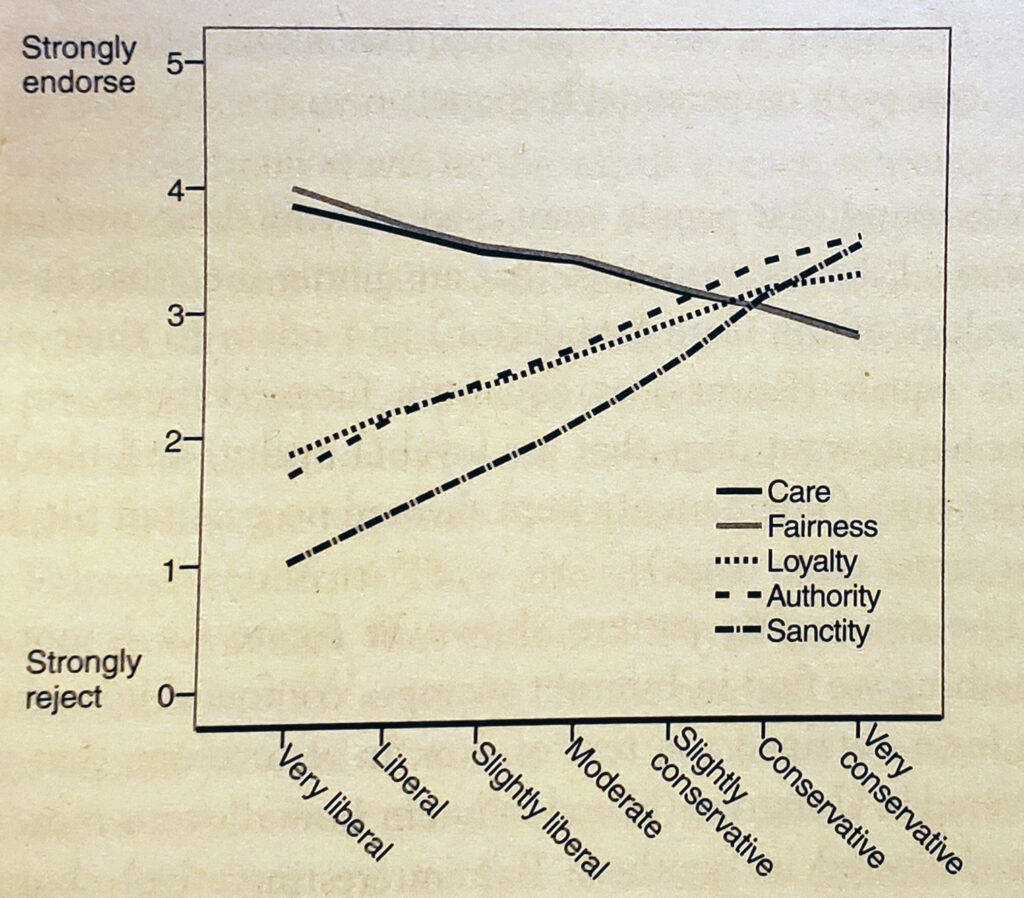
These illustrations from the book show the relative line weights that each party puts on each foundation:
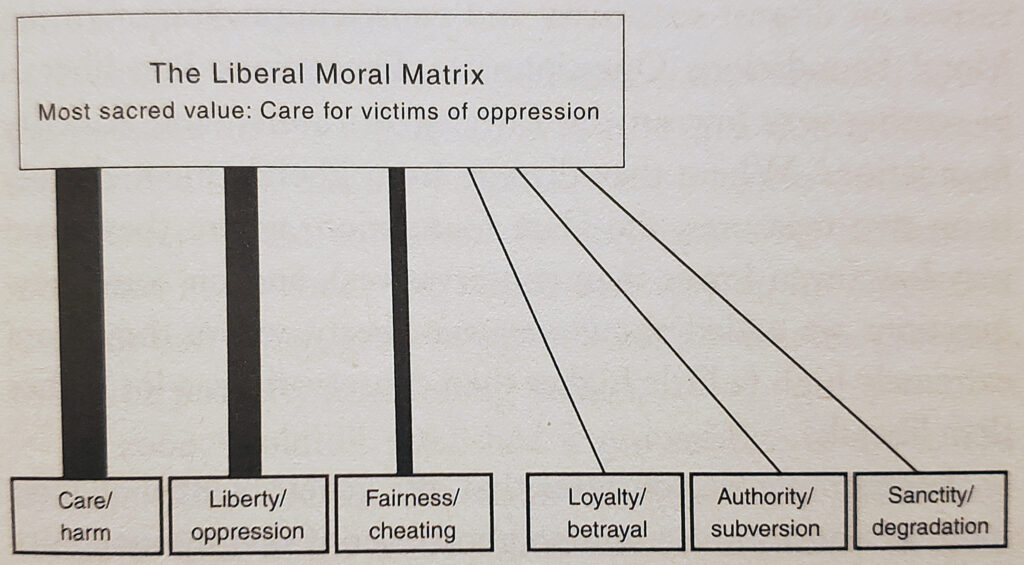
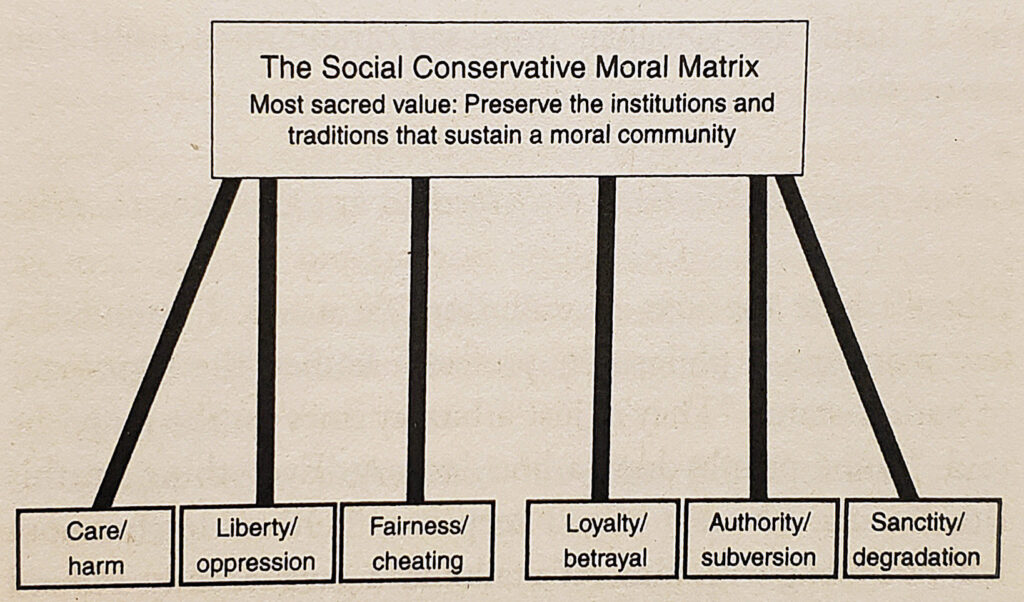
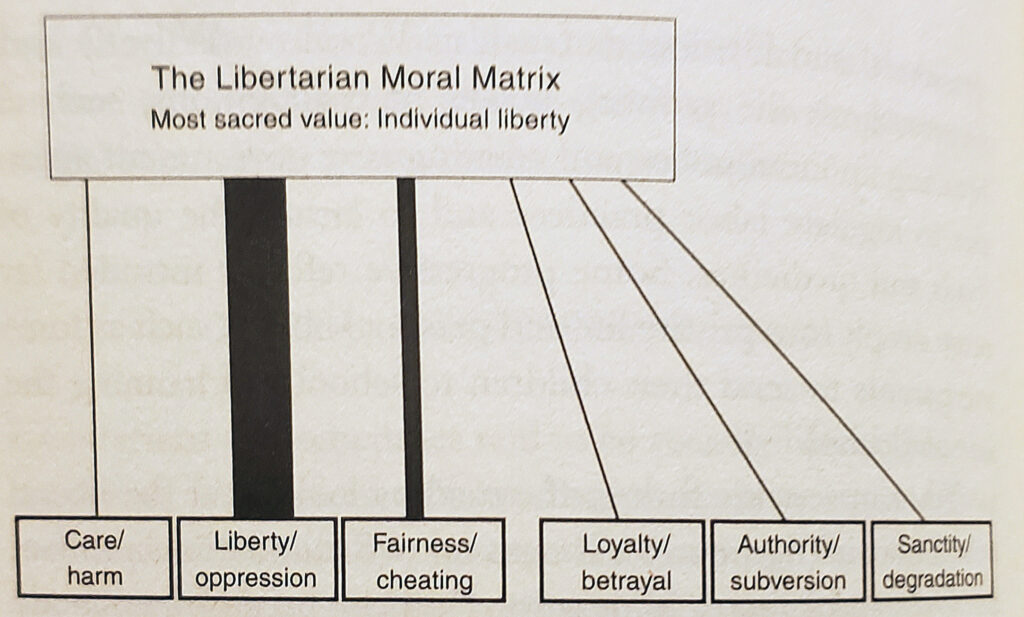
So which does better in politics?
Some politicians (especially liberal ones) focus on talking to the rider rather than the elephant. Obama and Harris were OK at talking to the elephant, but Al Gore and John Kerry focused entirely on the rider and hence did not connect as well with the voters (although Al Gore did win the popular vote). In general, Republicans focus on the elephant (no pun intended).
But generally, liberals use 3 of the 6 moral foundations whereas conservatives use all 6. If a voter cares a lot about one of the other 3 foundations, the conservatives have an advantage.
Part 3: Morality Binds and Blinds
Metaphor: We are 90% chimp and 10% bee
My summary: It all comes down to tribalism

Apparently, we have never observed two chimpanzees working together to carry a log. They work together in some ways (like defending their territories and hunting), but they tend to be very individualistic. Bees, on the other hand, seem to have no sense of self – only their hive.
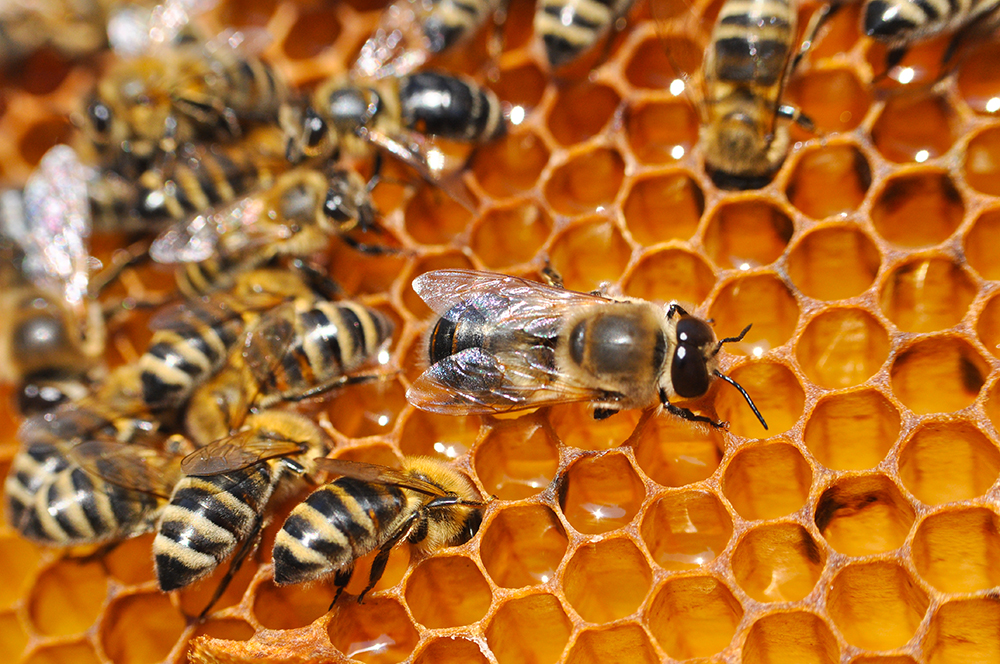
Human nature is mostly selfish, but with a groupish overlay that resulted from the fact that natural selection works at multiple levels simultaneously.
We evolved on two separate axis – as individuals (where certain traits benefited our individual survival) and in groups (where perhaps certain other traits were more useful). When our ancestors first started working together about 600,000 years ago, they lived in small groups (maybe mostly families). These groups competed for resources, so any group that found ways to grow and to be more cohesive had an advantage over those groups that did not. Protribalists had a huge advantage over people with anti-social behaviors. We essentially self-domesticated. Just as domesticated animals are more childlike, sociable, and gentle then their wild ancestors, our genes also evolved with these cultural innovations.
Note: They point out that group competition does not necessarily mean war. Each group competes to turn resources into offspring, and some just do it better than others.
But from an evolutionary perspective, group selection and individual selection must both be considered as both happen simultaneously. While most selection happened at the individual level, some did happen at the group level. Hence, while we mostly act as individuals, we each have a “hive switch” in our heads that can be flipped to make us focus on the group. We saw this happen 9/11.
This hive mentality can be cultivated. Armies do exercises and marching drills to active this hive switch. Soldiers become one unit. We find that soldiers risk their lives less for their country, and more for the sake of the people in their unit. “Me” becomes “We” and soldiers that battle together bond in ways that others cannot.
Most of our time is spent living in the “profane” – the day-to-day grind where we primarily focus on our individual interests such as wealth, health, and reputation (but are often nagged by a thought of a more purposeful life). On rare occasions, we are elevated to the “sacred” plane, where self disappears and collective interests dominate.
The hive switch can be flipped in many ways, such as:
- Awe with nature.
- Drugs (like psilocybin and MDMA)
- Raves (I’ve never been to one, so I need to ask my kids)
The effects normally last a few hours
NOTE: This resonates with me. When I attended the BLM protests in the summer of 2020, something similar happened to me. I felt very connected to the people in the crowd in a way that is hard to explain.
But while we are hive creatures, we are also conditional hive creatures – we tend to empathize with people who share our own moral foundations. From an evolutionary perspective, we did not evolve to love everybody unconditionally. People and societies that are involved in multiple hives (work, church, bowling leagues, etc.) are generally much happier than those that do not.
Religion
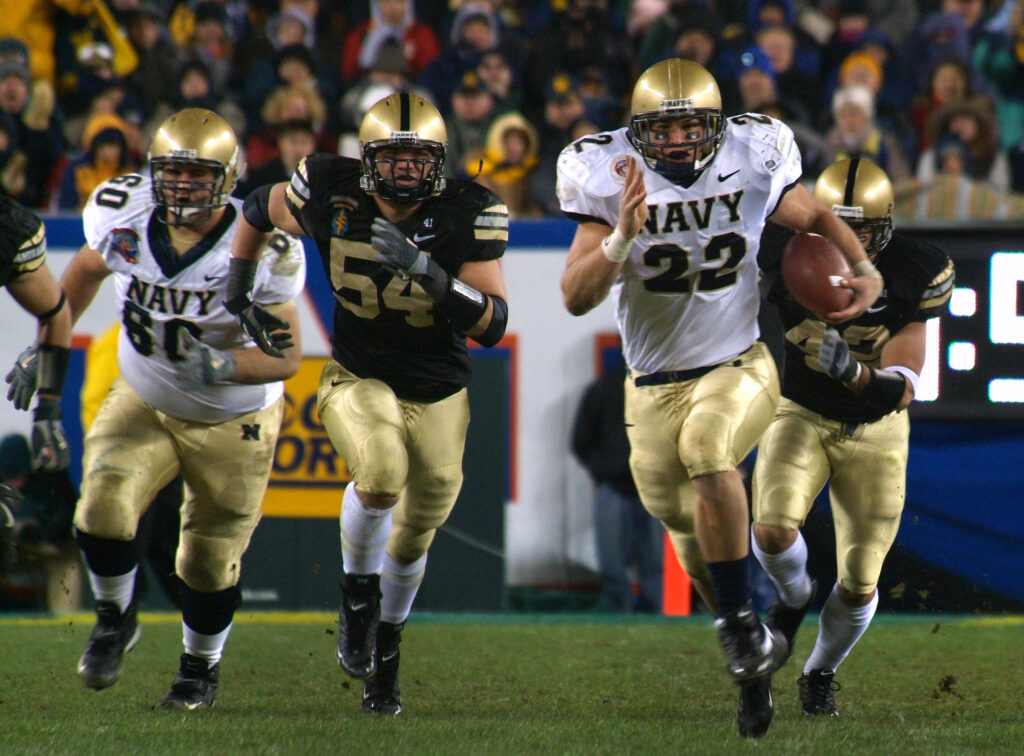
College football games can trigger the hive switch. Religions are the same way. Religions that do a better job of binding people together and suppressing selfishness spread much faster than other religions. He calls out Islam and Mormonism as examples. Historically, people belonging to religious societies are more likely to survive and to reproduce than those in less cohesive groups.
Regarding religion, through various studies and experiments they found that:
- Religious people really do donate more resources to help other people.
- The actual religion or religious practices of people do not correlate to how much they give. In other words, there is no correlation between the frequency of scripture reading, prayer, or other religious practices to the amount that they donate.
- What did correlate strongly, however, was how enmeshed people were in relationships with their co-religionists.
It is religious belonging that matters for neighborliness, not religious believing.
From a moral evolution perspective, religion should not be seen as a set of supernatural beliefs, but rather as a way to create moral communities. It is a way to bind ourselves into teams that can pursue larger projects.
Right vs Left
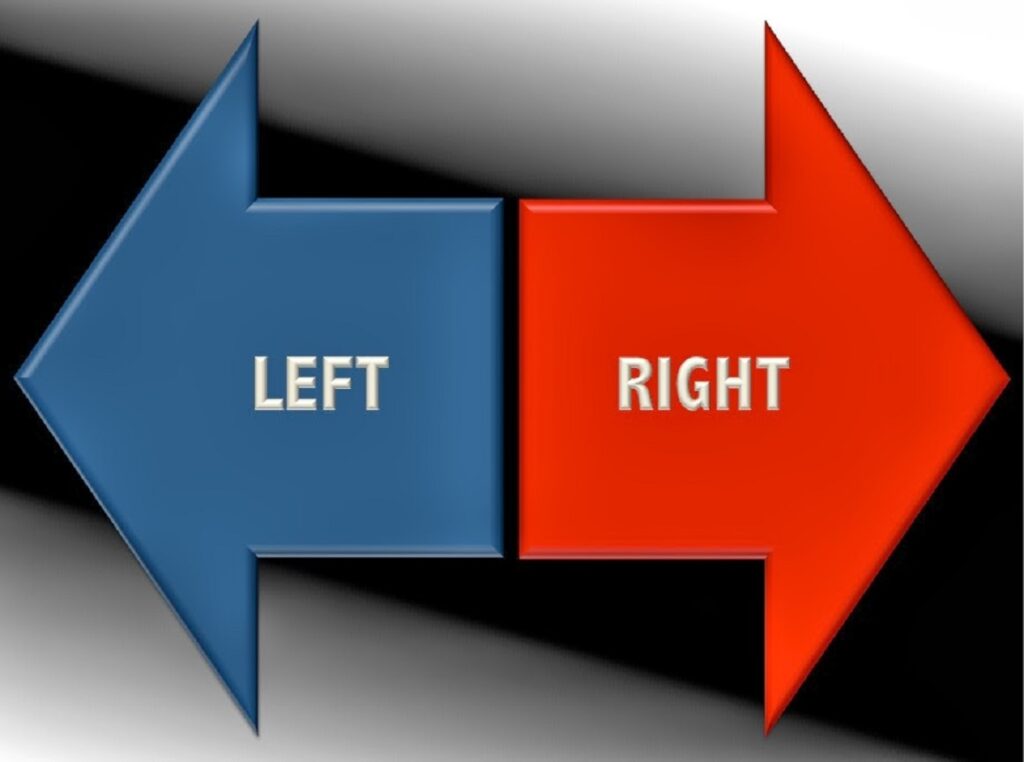
The most basic of ideological questions is: Preserve the current order, or change it? At the French assembly of 1789, those who favored preservation sat on the right side and those that favored change sat on the left. And hence, the terms “right” and “left” were born.
Self-interest does a poor job of predicting political attitudes. In many ways, genes do a better job. Genes can define a lot of our attitudes, including political orientation, music, taste on food, etc. Identical twins separated at birth are frequently found to have remarkably similar political leanings. Hence, you can almost call our political beliefs an inherited trait more than the environment in which we are raised.
- Conservative brains react much more sternly to signs of danger.
- Liberal brains have different receptors for transmitting dopamine, which is tied to sensation-seeking and openness to experiences.
The following are basic summaries of the liberal and conservative narratives in the US:
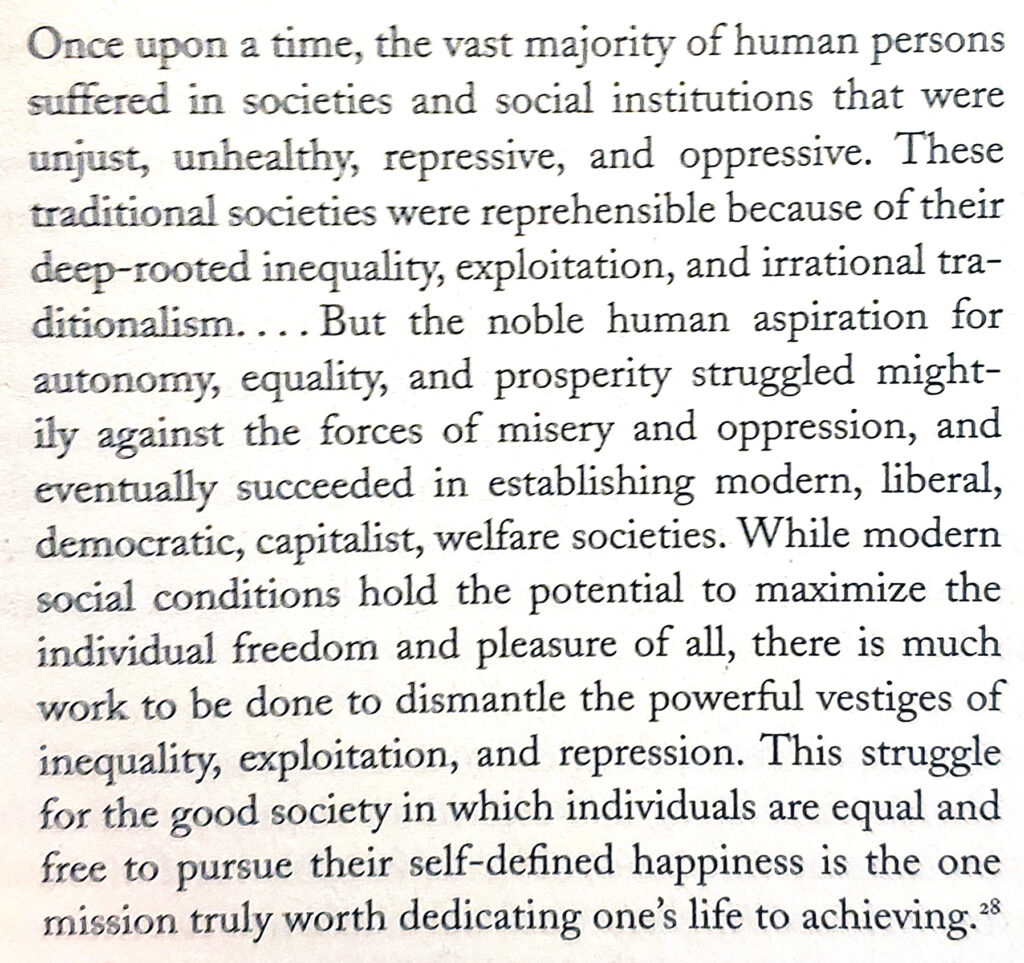
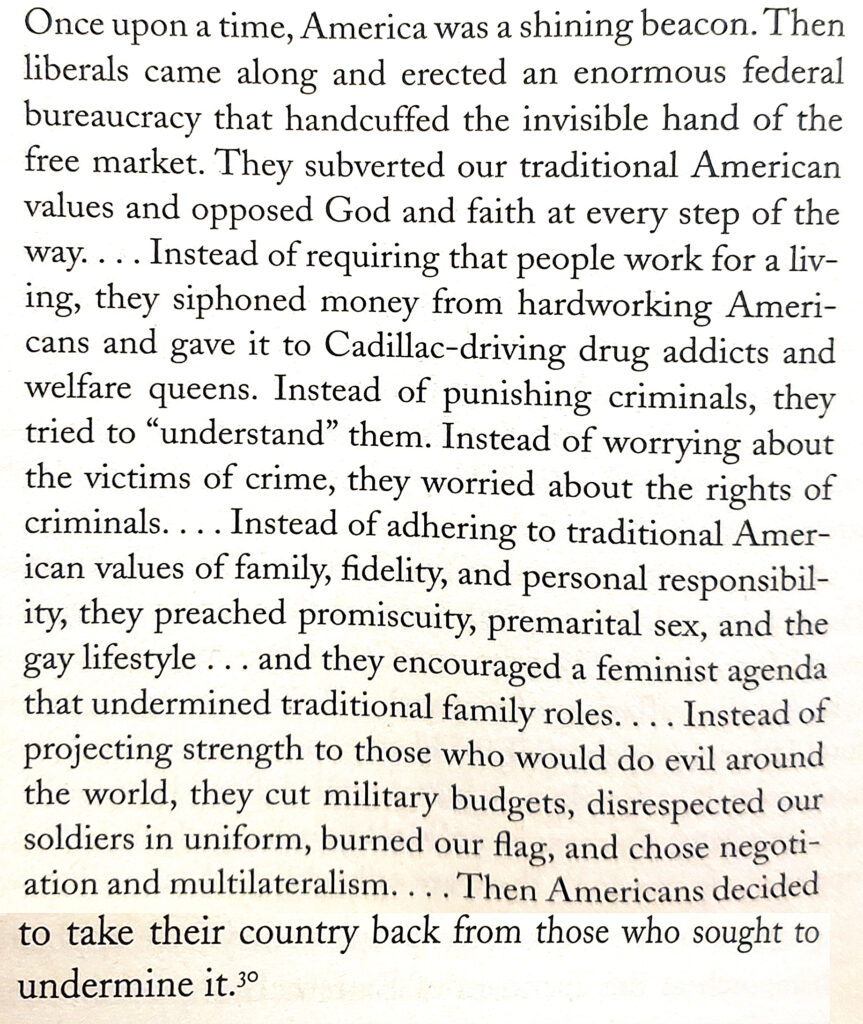
Both narratives are heroic, but the liberal narrative is one of action – the conservative is one of defense. But both narratives have their blind spots.
Conservatives can understand the liberal narrative better than liberals can understand the conservative narrative. This is because conservatives care about the 3 moral foundations of liberalism more than liberals care about the additional three foundations that conservatives employ.
Conservatism often gets conflated with orthodoxy. Orthodoxy is the view that there exists a “transcendent moral order, to which we try to conform the ways of society.” This includes those that believe that the bible should be used for legislation.
NOTE: Orthodoxy is probably far more prevalent today than when he wrote the book.
There are conservative intellectuals who reject orthodoxy, but well understand the importance of moral capital. This creates much stricter communities and helps the system function efficiently (that also solves the free rider problem). But it doesn’t promote fairness.
Liberals are often blind to the impact of their solutions on moral capital (which is why some reforms backfire). Conservatives, on the other hand, often fail to recognize classes of victims, fail to update institutions when needed, and fail to limit powerful interests.
Conservatives believe that people are inherently bad and require institutions, structures, and heirearchies in place to keep people in check.
Liberals believe the opposite: People are inherently good and will thrive if we mentor them and remove obstacles.
Conservatives tend to be the party of order and stability.
Libersls tend to be the party of progress and reform.
Like yin and yang, they can be complimentary.
Points and Counterpoints

Here are two primary liberal points:
Point 1: Governments can and should restrain corporate superorganisms
Corporations are superorganisms that will grow more powerful as they evolve, changing their host countries in various ways (but always to become more hospitable to the corporation). They will always look for ways to maximize their profits and to make others pay their expenses. They are rarely transparent and have too much political influence.
Governments are the only entities that can possibly stand up to a powerful corporation.
Point 2: Some problems can be solved by regulation
A good example is leaded gasoline. It greatly harmed children and adults, but the corporations fought any restrictions on this. Reagan almost reversed Carter’s regulations, but by the 1990s lead has been completely removed from gas. They believe that this corresponded to the rise in IQs during the 1990s and the drastic reduction in crime.
Sometimes the unintended consequences are very positive.
Counterpoints:
Counterpoint 1: Markets are miraculous
For most consumer goods, the market does a good job keeping prices fair. Consider LASIK – people usually pay out of pocket and they can choose their doctor based on experience and cost.
Counterpoint 2: You can’t help the bees by destroying the hive
If we try to destroy groups (country borders, religions, etc.), we essentially destroy the hives. Diversity seems to reduce social capital both between groups, but also within a group. People learn to hunker down.
Some liberal proposals to solve problems can break down groups. So sometimes, helping the few can hurt the many.
Conclusion
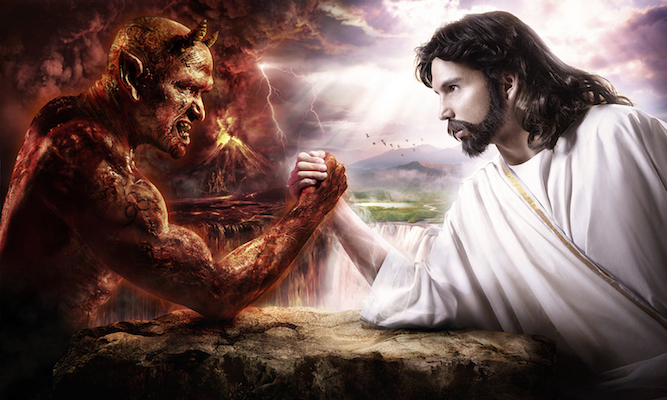
This book tries to show that groups are not always “good” or “evil” (as all sides like to do). Rather, our minds were designed for groupish righteousness. Our strategic reasoning is usually guided by our gut instincts, which often makes it difficult (but not impossible) to connect with people with different views.
As I learned from Eleanor Shellstrop in The Good Place – “This is why everybody hates moral philosophers”
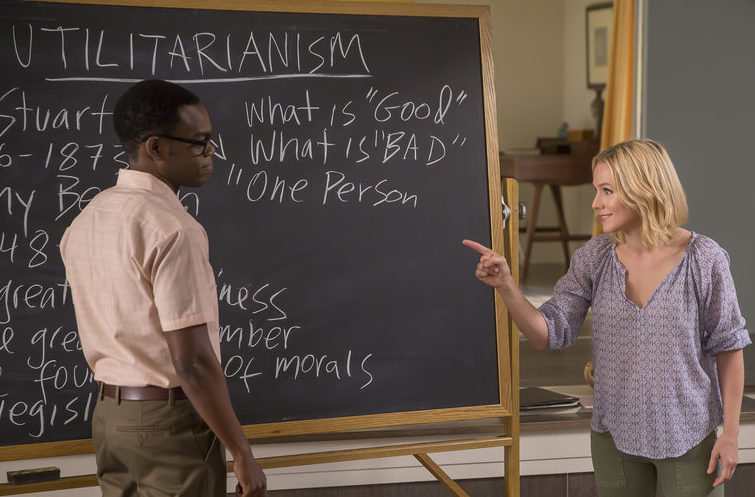

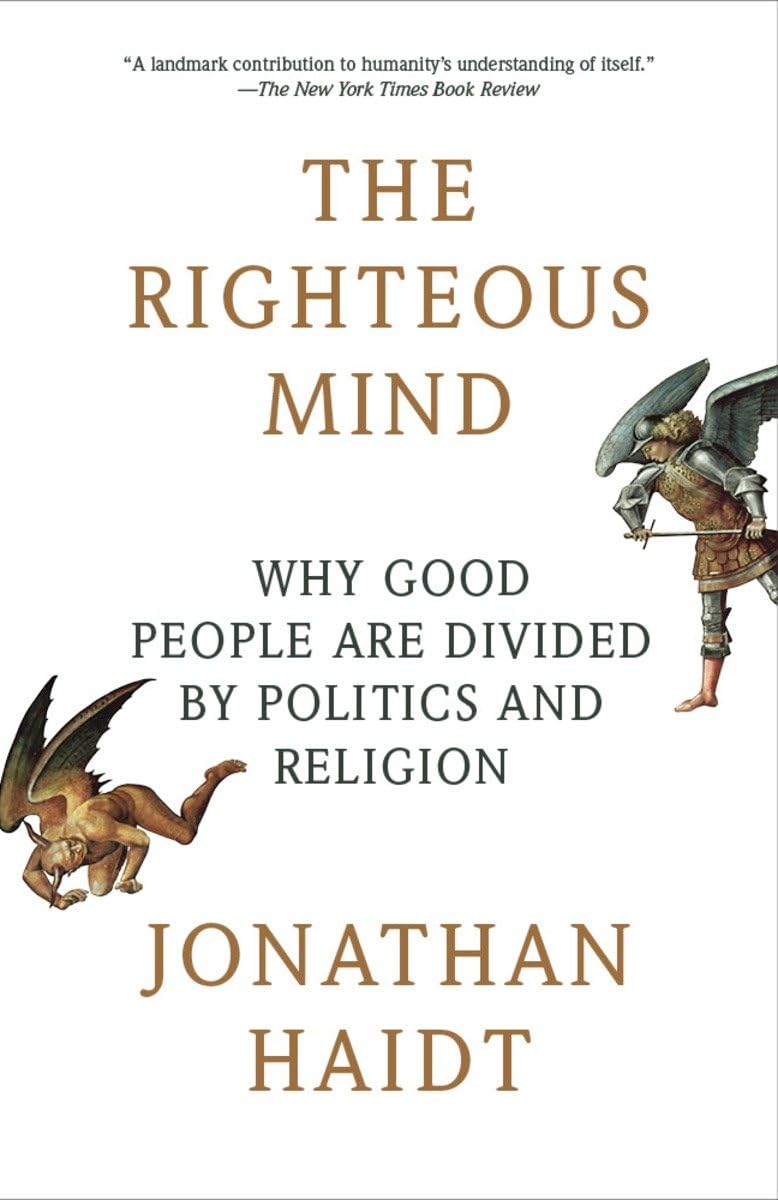
Pingback: Us and Them – Part 1: And after all we’re only ordinary men – Talking Smac
Pingback: Us and Them – Part 2: Us – Talking Smac